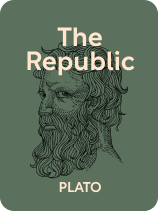

This article is an excerpt from the Shortform book guide to "The Republic" by Plato. Shortform has the world's best summaries and analyses of books you should be reading.
Like this article? Sign up for a free trial here.
What kind of people make the best leaders? What might an ancient allegory teach us about modern governance?
In his seminal work The Republic, Plato introduces the concept of philosopher-kings as ideal rulers. Plato’s ship allegory illustrates why philosophers are best suited for leadership roles. We explore the ship metaphor and its relevance to political governance.
Read on to discover how well Plato’s ancient wisdom resonates in today’s complex political landscape.
Plato’s Ship Allegory
Through the character of Socrates, Plato argues that philosophers make the best leaders, and he describes a class of philosopher-kings: a select group of protectors who act as the moral leaders and guides of the ideal city. These rulers are emblematic of the city itself and provide a model of a perfectly just life—the kind of life Socrates must prove is preferable in order to win the challenge.
In books V through VII of The Republic, Socrates uses three allegories to show why philosophers are ideal rulers. To illustrate the philosophical character and why it’s ideal for ruling, Socrates uses the allegory of a ship and its crew.
In Plato’s ship allegory, there are three types of people on the ship: 1) The captain of the ship isn’t a good seaman, but he’s physically strong and charismatic enough to keep everyone else in line. 2) The sailors aren’t much better than him at seafaring, but they desire power—constantly scheming to trick or force the captain to hand over his role. 3) The navigator avoids petty power struggles and instead dedicates himself to learning about weather, astronomy, and other seafaring skills. This makes him an excellent seaman, but nobody listens to him because he can’t help them gain power.
(Shortform note: The “Ship of State” has remained a common metaphor for government since Plato wrote The Republic, most notably referenced by Roman poet Horace in 23 BCE and American poet Henry Wadsworth Longfellow’s “The Building of the Ship” in 1849. However, over time the metaphor has become less about the corrupt nature of the crew and more about a patriotic vision of the nation-state as a project run collectively. According to this vision, the crew works together to navigate stormy seas—a metaphor for a state navigating upheaval or war, whether that state is Rome, the US, or somewhere else.)
Understanding the Ship
This ship serves as an allegory for Athens. The incompetent captain and power-hungry sailors represent politicians and orators, while the navigator represents the philosopher. Just as the navigator has the necessary seafaring knowledge to guide the ship, the philosopher has the necessary moral knowledge to guide society. And just as the navigator avoids petty power politics and is ignored as a result, philosophers aren’t interested in power and wealth and are therefore ignored.
Socrates argues that just as the navigator is the ideal leader of the ship, the philosopher is the ideal ruler of society. The philosopher’s lack of interest in power and wealth means they’ll be less corrupt, while their focus on knowledge makes them the most competent. Their dedication to knowledge also requires self-control and the courage to keep searching for answers to abstract, universal questions—all ideal qualities in a ruler.
(Shortform note: When Socrates talks about a philosopher, he uses a literal definition of the word. The word philosophy derives from the Greek “philosophia,” which consists of “philo,” or love, and “sophia,” or wisdom. Therefore, a philosopher is literally a “lover of wisdom” rather than the type of academic we associate the word with today. This is why Socrates can securely say that by definition, philosophers love and desire wisdom above all else.)

———End of Preview———
Like what you just read? Read the rest of the world's best book summary and analysis of Plato's "The Republic" at Shortform.
Here's what you'll find in our full The Republic summary:
- Plato’s concept of justice
- Why living a moral life is good for its own sake
- How later philosophers interpreted and responded to the ideas in The Republic






